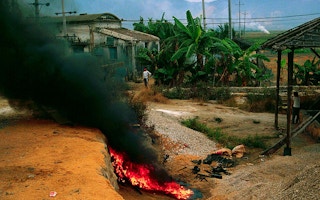China is taking steps to standardise its solid waste recycling industry, which despite being a burgeoning green sector has stoked environmental concerns due to reckless expansion.
The Ministry of Environmental Protection and other government agencies have launched a campaign targeting irregularities in the recovery of waste materials including electronics, tires, plastics, clothes and home appliances.
Until the end of the year, the government will crack down on small workshops producing heavy pollution, improve the infrastructure in industrial districts, and guide the sector’s healthy development.
While substandard firms will be shut down, legitimate recycling companies will be encouraged to accelerate business expansion by mergers and acquisitions.
The recycling industry still lags environmental demand with many firms too small and having weak pollution control, Qiu Qiwen, an environmental protection ministry official, said on Thursday.
“
Recycling is a good thing, but many companies cause additional pollution in the environment due to substandard operations.
Ma Jun, head, Institute of Public and Environmental Affairs
Qiu expects the campaign to eliminate outdated capacity, and step up the sector’s transformation.
The combined revenue of the 10 major recycled resources, including waste steel and paper, amounted to more than 590 billion yuan ($88 billion) in 2016, up 14.7 per cent from a year ago.
“Recycling is a good thing, but many companies cause additional pollution in the environment due to substandard operations,” said Ma Jun, head of the Institute of Public and Environmental Affairs, a Beijing-based NGO that aims to expand access to environmental information in China.
Imports of environmentally hazardous solid waste into China will end this year, and imports of solid waste that can be replaced by domestic resources will end by 2019, the State Council, China’s Cabinet, announced on July 27.
“However, illegal imported solid waste still exists in some major industries, and the main reasons are loose supervision and comparatively lower prices that can bring more profits,” Ma said. He said strict law enforcement is the fundamental way to standardize China’s solid waste recycling industry.
“Companies that could not meet the norms for pollutants discharge prescribed by law and regulations should never be given a license for operating,” he said, adding that it is not easy to detect all the illegal imported waste.
“If the small workshops producing heavy pollution are closed down, the legitimate companies can have greater market share,” Ma said.
This story was published with permission from China.org.cn

















